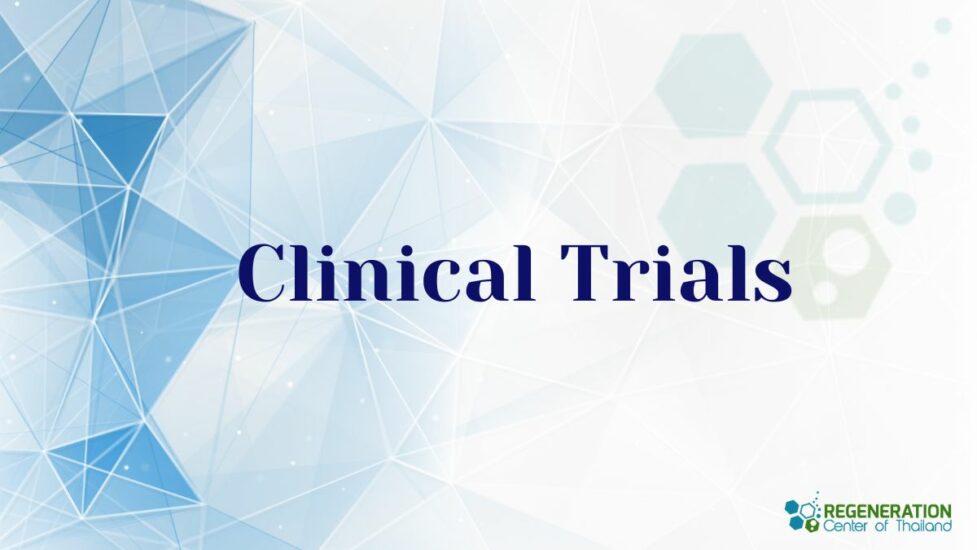Stem cell treatments and clinical trials have been ongoing for over 60 years. However, we are still in the early stages of stem cell therapy as an effective alternative to traditional pharmaceutical-based treatments. Much of the early work in stem cell clinical trials focused on the overall effectiveness and safety of the procedures involved. The primary concern with any new treatment is the long-term safety and standardization of results. There have been countless journals and stem cell research papers focusing on these clinical trials that have revealed promising results from these initial trials worldwide.
Here are some resources for clinical trials using stem cells around the world.
Open Stem Cell Trials – Currently Accepting New Patients
- Clinical study iPS cell therapy for eye disease – (Japan)
- ALS Clinical Trials – US and International – ongoing and updated regularly
- Mesenchymal Stem Cells Combined With Cord Blood for Treatment of Graft Failure – Phase 2 –
- In Vitro Expanded Allogeneic Epstein-Barr Virus Specific Cytotoxic T-Lymphocytes (EBV-CTLs) Genetically Targeted to the B-Cell Specific Antigen CD19 Positive Residual Or Relapsed Acute Lymphoblastic Leukemia After Allogeneic Hematopoietic Progenitor Cell Transplantation
- Treatment of Knee Osteoarthritis With Allogenic Mesenchymal Stem Cells
- Fractionated Stem Cell Infusions in Myeloma Patients Undergoing Autologous Stem Cell Transplant
Closed or Completed Stem Cell Trials – Results (Primarily in the United States unless noted otherwise)
- ALS and MND Stem Cell Trials at Emory University
- Clinical applications of mesenchymal stem cells for movement disorders
- Parametric vs nonparametric statistics
- Autologous stem cell transplantation in adults with acute lymphoblastic leukemia
- In vitro differentiation of human placenta-derived multipotent cells into hepatocyte-like cells.– Multipotent cells isolated from human term placenta (placenta-derived multipotent cells [PDMCs]) have been known to be able to differentiate into mesodermal lineage cells, including adipocytes and osteoclasts. The low infection rate and young age of the placenta compared with other tissue origins of adult stem cells make these cells attractive targets for cell-based therapy.
- Comparison of human placenta- and bone marrow-derived multipotent mesenchymal stem cells. Bone marrow is the traditional source of human multipotent mesenchymal stem cells (MSCs), but the placenta appears to be an alternative and more readily available source. This study comprehensively compared human placenta-derived MSC (hpMSC) and human bone marrow-derived MSC (hbmMSC) in terms of cell characteristics, optimal growth conditions and in vivo safety specifically to determine if hpMSC could represent a source of human MSC for clinical trial. MSC was isolated from the human placenta (hpMSC) and human bone marrow (hbmMSC) and expanded ex vivo using good manufacturing practice-compliant reagents
- The Transendocardial Autologous Cells (hMSC or hBMC) in Ischemic Heart Failure Trial (TAC-HFT) – The technique of transplanting progenitor cells into a region of damaged myocardium, termed cellular cardiomyoplasty, is a potentially new therapeutic modality designed to replace or repair necrotic, scarred, or dysfunctional myocardium. Ideally, graft cells should be readily available, easy to culture to ensure adequate quantities for transplantation, and able to survive in the host myocardium, often a hostile environment of limited blood supply and immune rejection.
- Australian Clinical Trials – Therapy for Peripheral Vascular Disease – Double-blind, randomized safety and feasibility evaluation of intra-arterial CD34+ cell delivery for severe peripheral arterial disease – This trial in Australia aims to compare the effect of the patient’s peripheral blood stem in treating patients with severe peripheral arterial disease. The trial is being conducted at the Alfred Hospital in Melbourne and proposes to recruit 20 subjects. The subjects will be randomly assigned to two groups. They will either receive a single injection of CD 34+ stem cells via the limb artery (experimental group) or a placebo injection (control group). Participants will be monitored for complications and assessed for changes in their clinical condition

